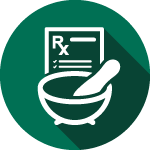Looking for a treatment option for patients with locally advanced basal cell carcinoma (laBCC)? See what ODOMZO® has to offer.
In addition to being the only hedgehog pathway inhibitor with 2 years of response1, ODOMZO is also widely covered across Medicare and commercial plans2
Three options to help your eligible patients access ODOMZO:

ODOMZO SUPPORTTM Patient Assistance Program (PAP)
- Helps eligible underinsured and uninsured patients receive ODOMZO (sonidegib)

Specialty Pharmacy (SP)
- Processes patient and prescription details via a prescription enrollment form
- Verifies patient's insurance benefits and determines whether a prior authorization is required
- Coordinates payment and follow-up to ensure patient receives ODOMZO

Specialty Distributor
(SD) — GPO/Health Systems/Hospitals Only
- Provides flexible and efficient delivery of ODOMZO for dispensing practices
- For contact information of ODOMZO SDs, click here
Click here to see how ODOMZO delivers effective and durable results
INDICATION
ODOMZO® (sonidegib) is indicated for the treatment of adult patients with locally advanced basal cell carcinoma (BCC) that has recurred following surgery or radiation therapy, or those who are not candidates for surgery or radiation therapy.
IMPORTANT SAFETY INFORMATION
WARNING: EMBRYO-FETAL TOXICITY
- ODOMZO can cause embryo-fetal death or severe birth defects when administered to a pregnant woman. ODOMZO is embryotoxic, fetotoxic, and teratogenic in animals
- Verify the pregnancy status of females of reproductive potential prior to initiating therapy. Advise females of reproductive potential to use effective contraception during treatment with ODOMZO and for at least 20 months after the last dose
- Advise males of the potential risk of exposure through semen and to use condoms with a pregnant partner or a female partner of reproductive potential during treatment with ODOMZO and for at least 8 months after the last dose
WARNINGS AND PRECAUTIONS
Embryo-fetal Toxicity: ODOMZO can cause embryo-fetal death or severe birth defects when administered to a pregnant woman. Females of Reproductive Potential: Verify pregnancy status prior to initiating ODOMZO. Advise females to use effective contraception and not to breastfeed, due to the potential for serious adverse reactions in breastfed infants, during treatment and for at least 20 months after the last dose. Report pregnancies to Sun Pharmaceutical Industries, Inc. at 1-800-406-79841-800-406-7984.
Males: Advise males to use condoms, even after a vasectomy, and to not donate semen during treatment and for at least 8 months after the last dose to avoid potential drug exposure in pregnant females or females of reproductive potential.
Blood Donation: Advise patients not to donate blood or blood products while taking ODOMZO, and for at least 20 months after the last dose because their blood or blood products might be given to a female of reproductive potential.
Musculoskeletal Adverse Reactions: Musculoskeletal adverse reactions, which may be accompanied by serum creatine kinase (CK) elevations, occur with ODOMZO and other drugs which inhibit the hedgehog Hh pathway. Obtain serum CK and creatinine levels prior to initiating therapy, periodically during treatment, and as clinically indicated. Temporary dose interruption or discontinuation of ODOMZO may be required based on the severity of musculoskeletal adverse reactions.
Premature Fusion of the Epiphyses: ODOMZO is not indicated for use in pediatric patients. Premature fusion of the epiphyses has been reported in pediatric patients exposed to ODOMZO and other Hh pathway inhibitors. In some cases, fusion progressed after discontinuation.
Drug Interactions: Avoid concomitant administration of ODOMZO with strong and moderate CYP3A inhibitors. If a moderate CYP3A inhibitor must be used, administer for less than 14 days and monitor closely for adverse reactions, particularly musculoskeletal. Avoid concomitant administration of ODOMZO with strong and moderate CYP3A inducers.
Geriatric Use: There was a higher incidence of serious adverse events, Grade 3 and 4, and events requiring dose interruption or discontinuation in patients ≥65 years compared with younger patients; this was not attributable to an increase in any specific adverse event.
Most Common Adverse Reactions: The most common adverse reactions occurring in ≥10% of patients were muscle spasms (54%), alopecia (53%), dysgeusia (46%), fatigue (41%), nausea (39%), musculoskeletal pain (32%), diarrhea (32%), decreased weight (30%), decreased appetite (23%), myalgia (19%), abdominal pain (18%), headache (15%), pain (14%), vomiting (11%), and pruritus (10%).
Click here to see the full Prescribing Information for ODOMZO, including Boxed WARNING.
References:
1. ODOMZO [prescribing information]. Cranbury, NJ: Sun Pharmaceutical Industries, Inc.; 05/2019. 2. Data on file. Sun Pharmaceutical Industries, Inc. Princeton, NJ. March 2017.This website is intended for use by US Healthcare Professionals only. For patient site, click here.